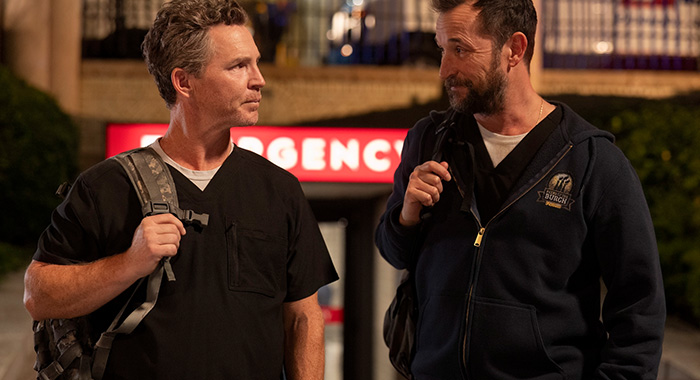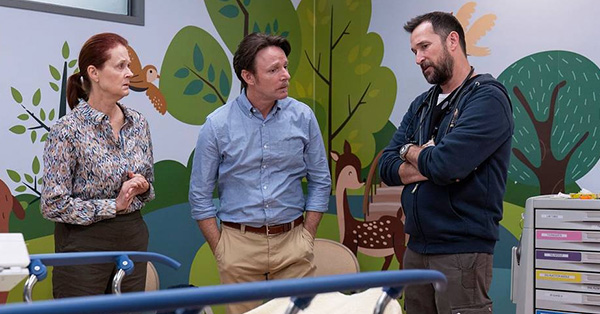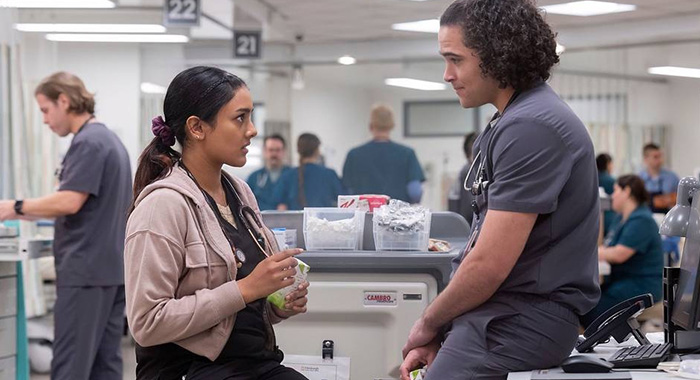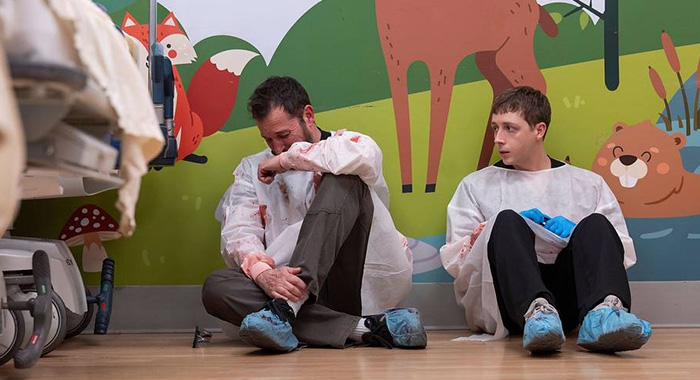
The Pitt is a miracle of a show. It started with a dogged commitment to depict the realities of Emergency Medicine in a post-COVID world, and the result redefined what is possible in a medical drama. It was recently honored with 13 Emmy Nominations, including Best Drama, Best Writing, and Best Lead Actor for Noah Wyle. Sadly, that was nowhere near enough, particularly for this show.
The Pitt deserves more attention (others have already said as much, and we agree), and the reason for it is very similar to the industry it highlights. The brilliance of The Pitt is often overlooked because it is subtle. When it’s working well, you’ll never see it. Medicine is not flashy; it’s grueling, thankless, skilled work, and sadly, it’s needed more than ever before. So forgive us if we would like to plead the case for the scrappy drama that could. It may inspire those in the Television Academy to wise up to what we have known since January. Hear us out on this one, but The Pitt is the best show on television, but they made it look so effortless, y’all might have missed it’s a masterpiece.

Grey’s Anatomy was the last medical show nominated for Best Drama at the Primetime Emmys, marking over 30 years since St. Elsewhere became the first. To think there was reinvention left to be had in the genre defies expectation even in Hollywood. However, a quick scroll through any social media platform under #ThePitt will inundate you with real-life professionals of every stripe commenting on its accuracy. Thus, it redefined what it means to be medically accurate on television. ER techs, gynecologists, emergency medicine professionals, and even hospital administrators have jumped into the fray to discuss precisely what The Pitt gets right and why many are delighted by it. This is before we even mention its real-time presentation. Each season of The Pitt chronicles one 15-hour shift in real time, one hour at a time, giving the audience a real-time peek into life on the job in an ER.

And it is not a gimmick. It is a valuable tool in aid of the story, characters, and realism. Pulling it off requires careful planning, timing, and skill. It also takes a keen eye to appreciate. In episode 1, for example, there are background actors who don’t even speak but will play pivotal roles in later episodes. Additionally, in the last parts of the season, people we met back when we barely understood the format return in meaningful ways. The creators crafted a symphony of movement, camera work, editing, and, yes, science to keep the audience fully immersed in the action. It’s not an accident, and that level of detail is applied to everything, from the Lucas machine that delivers chest compressions to the slap bracelets used during a mass casualty incident.

The actors underwent rigorous rehearsals to learn the medical choreography, like fight sequences. However, unlike the talented stunt performers and actors from The Last of Us, these moves could not appear messy. Where messy movements reinforce the realism in a post-apocalyptic world, the same would rip you from a medical drama. These medical sequences are often very complex procedures that are scripted and shot to appear as everyday as tying a shoe, with no stunt doctor on the sideline to fill in if Wyle couldn’t execute the movement. And miraculously, said accuracy is executed without sacrificing a single ounce of character-driven drama. After years of conversations with medical professionals saying, “I wish you had done this on ER,” executive producer and director John Wells, Wyle, and the crew rewrote that exhaustive list, turned it into to-dos, and molded it into TV gold.
The Pitt chose to put the medicine first, but the show is layered with rich characters that make every moment more heightened as we empathize, hope, and stress alongside them. One of the most brilliant ways they did this was by ensuring that each character, from minor to recurring, had depth. Each patient interaction reveals something meaningful. How Dr. Langdon (Patrick Ball) speaks to a patient versus how Dr. Mohan (Supriya Ganesh) or Wyle’s Dr. Robby does tells us who they are as people and doctors. In the first hour, The Pitt provides a backstory for every primary and supporting character, as well as some guest stars, with surgical precision. How they wear their scrubs and who they interact with on shift reveal something about them.

The choice to portray these professionals as equally competent and flawed further reinforces this point. Many medical dramas depict doctors as superhuman, the best of the best. Think of Cristina Yang (Sandra Oh) or Derek Shepard (Patrick Dempsey) on Grey’s Anatomy or Hugh Laurie’s House, characters who always manage to win in the end. In The Pitt, nobody is beyond reproach. Everyone has their own biases. And if you watch season 1 with a careful eye, you will see every character get it wrong at least once. Even our sad boy attending physician Dr. Robby and his counterpart, ER Cowboy Dr. Jack Abbott (Shawn Hatosy), are shown as fallible. That kind of character imperfection is what makes them compelling. Dr. Santos (Isa Briones) is cocky and prickly, Dr. Langdon is self-important, Dr. Javadi (Shabana Azeez) is a prodigy with a temper, and Dr. Mel (Taylor Dearden) is our neurodivergent queen. The audience learns all of this in the pilot, and even more with every hour, using just a few lines of dialogue. And it doesn’t stop with just the doctors; it also extends to patients. They may come and go, but they get to shine as fully realized people regardless of how long they are on screen.

Beyond the characters and technical precision, the writing is the show’s greatest strength. The fusion of technical realism with character study, the blend of science with drama, is most evident in the man at the center of it all. For one day over the course of one season, we follow Dr. Robby, the weary attending physician, as he lives through one of the worst days of his life. In one of the final episodes, Robby has his most devastating moment. He realizes the resident he thought was his best is a drug addict. His favorite charge nurse and work wife is likely quitting. His efforts to mentor are entangled by his personal history, and he comes to a painful realization that he has been too traumatized to see clearly how long he has been failing. And in a moment of overwhelming grief, he has a panic attack, unable to return to work, right amid the mass casualty incident that is ravaging his emergency room. The man who has cursed the absence of God for 13 episodes is found by a medical student, wracked with grief and panic, unable to do anything but pray. I dare you to watch that moment, then have the audacity to say Best Lead Actor in a Drama Series goes to anyone else.

Mike White’s The White Lotus has now given us yet another season of compelling class commentary, examining the humanity of the ultra-wealthy and those who serve them. Severance will have the internet buzzing for days on a viral dance sequence or an obscure cartoon in the background of a shot. These shows will be part of the zeitgeist. They’ll be parodied on SNL. And some may say they deserve to win. But we beg to differ.
It’s not for me to say that The Pitt was wronged by its 13 Emmy nominations — you’d have to catch me at happy hour for that. Lest we forget, the show debuted during the Los Angeles wildfires, one of the city’s most tumultuous times. That it found and built an audience without traditional press or promotion is yet another miracle in itself. This isn’t to say others aren’t deserving, but The Pitt is exceptional. So let’s not treat The Pitt the same way we treat healthcare workers. Let’s not wait to recognize them when things are at their worst. Let’s remember them now, while they’re doing the hard work, while they inspire change and influence others. Let’s give them a little Emmy love to keep them going.

Let the applause on Emmy night remind us of the clapping we did every evening for frontline workers during the pandemic. The folks at The Pitt need it so they can keep doing good work. Television needs it, so it can inspire others to do the same.
